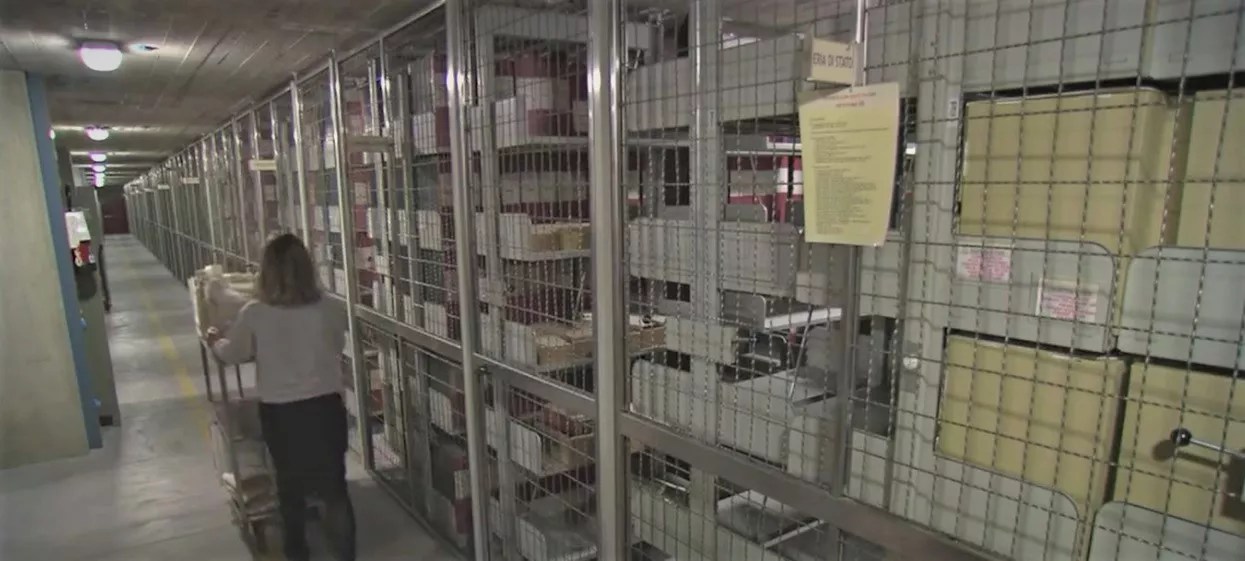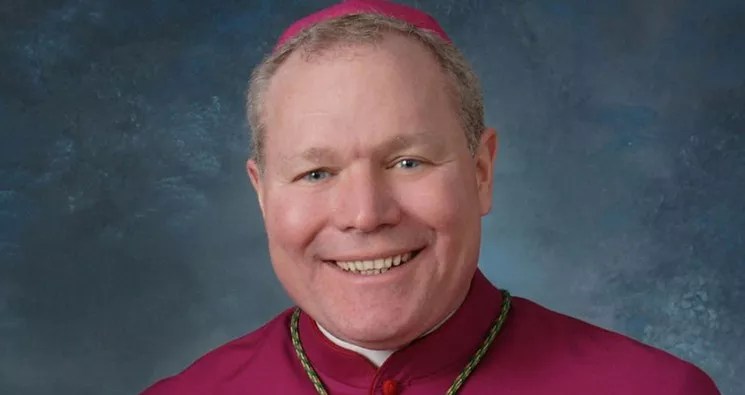
Video of Vatican Television Center

Audio By Carbonatix
The whole business about the Catholic Diocese of Dallas in January publishing a list of 31 so-called “credibly accused” priests seemed weird at the time. Credibly, who says so? Now as the story grows only darker, we have to wonder how the diocese, which is the regional headquarters of the church, could not have known what terrible mistakes it was making.
Clearly, based on an affidavit supporting a raid on diocesan records last week (see below), the Dallas Police Department doesn’t believe the diocese has ever played straight on these charges. The affidavit is only that – an allegation or claim. It isn’t a verdict. It isn’t even an indictment. The church deserves its say.
But to believe the claim of Bishop Edward Burns last week that cops who made the raid on his locked trove of sex abuse records only wanted to “probe the wounds,” we would have to believe the police are doing an awful lot of very clever, very detailed on-the-record lying. It doesn’t sound like it.
And if they’re not – if the claims of subterfuge and obfuscation that police made in the affidavit are true – then we have to weigh a different painful possibility. That possibility is that Burns’ entire “credibly accused” campaign has been a con job from the beginning at two important levels.
The first level of the con, if it has been a con all along, would be the conning of the public. Much as we might resent an attempt to fool us and see it as especially unbecoming of the clergy, recent events in Washington should have taught us all by now that it’s not against the law to lie to us.
It’s the other level of the con job suggested in the affidavit that will draw blood, if it turns out to be true. While not making direct accusations, the affidavit describes circumstances that would leave no other conclusion than that a number of diocesan officials including the bishop, lay people and church lawyers have conspired to thwart a police investigation into criminal acts that no reasonable adult would view as anything less than heinous.
“The fact police received ‘unofficial’ requests they investigate priests not deemed credibly-accused reveals a lack of confidence in the established vetting process or a knowledge the process failed.” — Dallas Police Detective David Clark
The following are just two of several examples in the affidavit: Father Alejandro Buitrago, 78, a priest at St. Mark the Evangelist in Plano, “quickly befriended” the family of one alleged victim when her parents divorced. During the period of alleged abuse, the victim was between the ages of 5 and 7.
In 2015 when she was an adult, she reported to diocesan officials that Buitrago came to her house in the ’80s when she was a child, kissed her on her mouth, sat her on his lap and rubbed his erect penis against her vagina.
In 2019 when Detective David Clark met with diocesan officials, they named Buitrago as one of their “credibly accused.” But when Clark searched Plano police records for 2015, he could find no report made by the diocese to police.
So here’s the problem, if I even need to state it: If someone tells you a man in your employment went to a house and engaged in sex acts with a 5-year-old, you go to the cops. It isn’t up to you to sit on that report for four years. It isn’t up to you to decide if the man has been “credibly accused.” Forget credibly. You go to the cops. And if you know about it and you have authority and you also have a money liability and you don’t go to the cops, then you risk making yourself a criminal co-conspirator.
Who doesn’t know that? If you were pretty sure you knew that somebody had killed somebody, you would go to the cops, right? You would go because the cops need to know. But you would also go because you wouldn’t want to be in on a murder. This is right up there with murder. We have to ask ourselves how the diocese couldn’t have known that.
Father Richard Thomas Brown was at Holy Family Catholic Church in Irving in the 1980s. Detective Clark found his way to an alleged victim of Brown at Holy Family and interviewed her. The affidavit doesn’t say how old she was during the abuse, but she was a child. She told Clark that Brown’s practice was to come to her “faith formation” classes and take her to his church offices or to his residence. There, he stuck his finger in her vagina, she told Clark, and told her to “touch” his penis, as the affidavit decorously puts it.
She told Detective Clark she first notified the diocese of Brown’s abuse of her in 2004 as an adult. When Clark asked for the files on Brown, the diocese produced 541 pages, none of which mentioned her. Clark told the diocese that the Holy Family victim’s 2004 report was missing from the files. The diocese then turned over 51 more pages, this time including oblique references to the report but scant detail.
In the meantime, Clark’s review of the rest of the Brown file revealed two other reports, one of his sticking his finger in a girl’s anus, another of his lifting a girl’s blouse so he could get his mouth on her breasts.
Clark asked the diocese to give him additional files on Brown that Clark believed the diocese had in its possession. According to Clark’s affidavit, these files involved actions by two previous bishops who knew of the charges against Brown but moved him to new parishes, one of which had a school. So at least in theory, these files could tie the diocese directly to efforts to cover up the charges against Brown.
In February, a lawyer for the diocese refused Clark’s request, telling him it was “overly broad,” “unnecessary” and “inappropriate.” That was only a few months ago, fully under the watch of Bishop Burns.
According to Burns’ system, priests would only be identified publicly as credibly accused when he decided they would. Even then, they would be accused only on the basis of the evidence that the bishop and his lawyers agreed to pass on to police, not including some evidence the police asked for directly and specifically. The end product, the list of “credibly accused clergy,” would be definitive and comprehensive.
Clark says in his affidavit that church officials declined to tell police how many priests had been accused of sexual abuse but were effectively cleared by the church. In other words, Clark wanted to know how many accusations had been deemed not “credible” by church officials. Clark says in the affidavit that on one occasion when he was discussing this issue with the church, church officials dropped the name of another priest whom they thought Clark should look into, one whose name was not on the credibly accused list.
Clark says in the affidavit, “The fact police received ‘unofficial’ requests they investigate priests not deemed credibly-accused reveals a lack of confidence in the established vetting process or a knowledge the process failed.”

Bishop Edward J. Burns
Roman Catholic Diocese of Dallas
At the end of the day last Friday, Bishop Burns unleashed a tirade against the police department, using the word “enemies.” In his statement, Burns said, “There are no claims of new abusers in this (Clark’s) affidavit.” But there is a “new” abuser in Clark’s affidavit – the one whose name church officials dropped in the meeting with Clark.
“Only the bishop is to have the key to the secret archive … (and) documents are not to be removed from the secret archive or safe.” — Roman Catholic Church canon law
The Bishop said in his statement: “… every person being investigated in this affidavit was reported by the Diocese (and) appears on the published list …” But if Clark is telling the truth about the additional name, then the Bishop is not telling the truth.
The Bishop seems to directly contradict himself by conceding that an additional name was provided: ” … while we had insufficient information to arrive at a finding of a credible allegation, (we) felt that the Police should nevertheless do an investigation.”
That explanation seems to undermine the entire thesis of the so-called definitive list of “credibly accused” priests. The Bishop’s explanation suggests that maybe another entire list could be compiled of priests who were accused not credibly but semi-credibly – credibly enough for the cops to investigate. And that sure feels like something for the cops to determine, not the church.
Another theme in this affidavit that may not come across in some of the straight news coverage is the relentless and fairly genius bulldogging of the evidence by a very determined cop. Clark doesn’t present any of this in a way that sounds even vaguely like bragging, but the fact is that he just kept going from source to source, archive to archive, knocking on every door until he found the evidence that unlocked the evidence.
This effort is by no means only local. Police are raiding Catholic archives around the country, and, as Clark conveys in the affidavit, they are all helping each other know what to look for. The hunt everywhere is for what are called “claimant files.” Those are files describing claims and civil settlements – we might call them payoffs – in unnumbered cases in which evidence of criminal acts may not ever have reached police.
The affidavit quotes Roman Catholic Church canon law, which prescribes that the claimant files at each diocese must be kept in a “secret archive.” Church law states specifically that, “Only the bishop is to have the key to the secret archive … (and) documents are not to be removed from the secret archive or safe.”
Who would even put that in writing? I try to imagine a tobacco company storing all of its unreported cancer litigation in a central place, calling it a “secret archive” and then stating in a public document, “Only the CEO is to have a key to the secret archive.”
I guess you only do something like that if you have been getting away with your conspiracy for a very long time, so long that now you think the cops and the law itself are your enemies.
Catholic Affidavit From Source by on Scribd